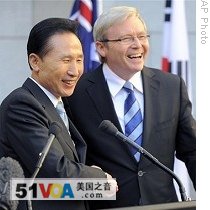Sydney
10 March 2009
Australian farmers are urging their political leaders to secure a swift trade accord with South Korea, ahead of free-trade negotiations that are scheduled to start in May. Australian beef producers are worried that their hopes for greater access to the lucrative Korean market will be derailed by an expected return of American beef exports, which have been affected by a case of mad cow disease.
 |
| South Korean President Lee Myung-bak shakes hands with Australian Prime Minister Kevin Rudd during press conference in Canberra, 05 Mar 2009 |
Australia's beef farmers have moved quickly to urge the government to make sure their lucrative sales to South Korea are maintained, as American producers prepare to re-enter the market.
Until four years ago, the United States was the largest exporter of beef to South Korea. The trade was halted after bovine spongiform encephalitis - or mad cow disease - was discovered in an American cow. South Koreans subsequently banned importation of American beef.
Sales of U.S. beef are to resume when Washington and Seoul ratify their free-trade agreement, which would likely give American exporters preferential terms.
David Inall from the Cattle Council of Australia says it is important that the interests of its members are looked after, amid the threat of more competition from American farmers.
"The South Korean market is critically important for the Australian beef industry. It's our third largest market. It has recorded significant growth over the past four to five years," he said.
Exports of Australian beef generate $480 million, annually.
Australian Trade Minister Simon Crean is keen to maintain his country's strong beef exports to South Korea.
"The U.S. free-trade agreement that now gives, opens up access again to U.S. beef into the Korean market is another reason why we have to get this FTA (Australian-South Korean free-trade agreement) up," he said. "We can't be put at a competitive disadvantage now that we've established such a strong toehold. So yes, beef's one of those key areas of interest."
Any free-trade pact between Australia and South Korea would be expected to lower a range of tariffs to help expand trading links between the two nations.
In 2008, bilateral trade stood at $23 billion.